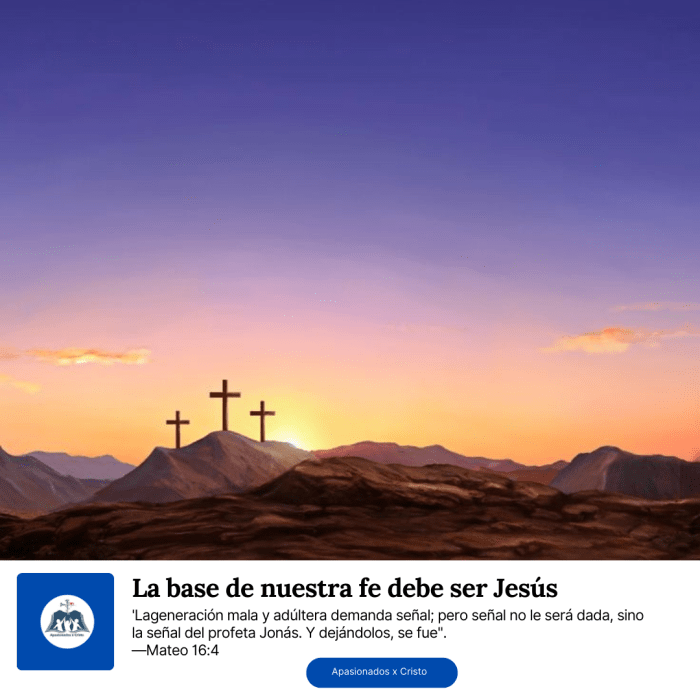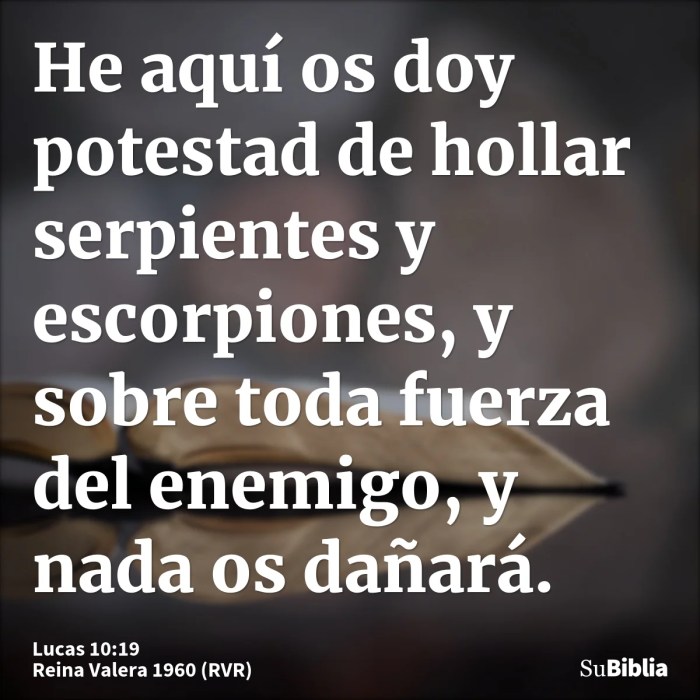He aqui os doy potestad – He aquí os doy potestad, a phrase that resonates through history and culture, invites us on an intriguing journey. Its origins, biblical significance, and far-reaching influence make it a captivating subject to delve into.
Emerging from the biblical narrative, this phrase holds immense weight, shaping beliefs, inspiring art, and leaving an enduring mark on society. Join us as we explore the multifaceted nature of he aquí os doy potestad.
Etymology and Linguistic Roots

The phrase “he aquí os doy potestad” originates from the Latin phrase “ecce do vobis potestatem”, which means “behold, I give you power”. It is a biblical quote from the Gospel of Luke (10:19), where Jesus grants his disciples the authority to cast out demons and heal the sick.
The phrase is composed of the following elements:
- Ecce: Latin for “behold” or “look”.
- Do: Latin for “I give”.
- Vobis: Latin for “to you” (plural).
- Potestas: Latin for “power” or “authority”.
Similar phrases or idioms exist in other languages, such as:
- English: “I give you power over all the power of the enemy”
- Spanish: “Os doy potestad sobre toda fuerza del enemigo”
- French: “Je vous donne pouvoir sur toute la puissance de l’ennemi”
Biblical Context and Significance

The phrase “he aquí os doy potestad” (“behold, I give you authority”) appears in the Gospel of Luke, Chapter 10, Verse 19.
In this passage, Jesus Christ is sending out 72 disciples to preach the gospel and heal the sick. Before they depart, he gives them authority over unclean spirits and the power to heal diseases.
Significance, He aqui os doy potestad
This phrase is significant because it demonstrates the authority and power that Jesus Christ has given to his followers. He has empowered them to continue his work of healing and preaching the gospel.
This authority is not limited to the original 72 disciples but extends to all who believe in Jesus Christ. We are all called to share the gospel and to heal the sick in his name.
Interpretation and Theological Perspectives: He Aqui Os Doy Potestad

The phrase “he aquí os doy potestad” has been subject to various interpretations, each carrying distinct theological implications. Some perspectives on its meaning and significance include:
Literal Interpretation
This interpretation takes the phrase at face value, understanding it as a direct grant of authority from Jesus to his disciples. According to this view, Jesus bestowed upon his followers the power to perform miracles, heal the sick, and cast out demons.
Metaphorical Interpretation
Some theologians interpret the phrase metaphorically, seeing it as a symbolic representation of the disciples’ mission and responsibilities. In this view, the “power” granted is not supernatural abilities but rather the authority to proclaim the gospel, forgive sins, and lead others to salvation.
He aquí os doy potestad… to understand the complexities of form 1120s schedule m 3. This comprehensive guide ( form 1120s schedule m 3 ) provides a thorough explanation of the form’s requirements, ensuring that you can navigate the process with confidence.
With this knowledge, you can return to he aquí os doy potestad with a deeper understanding of the financial intricacies that shape our world.
Contextual Interpretation
This interpretation considers the phrase within the broader context of Jesus’ teachings and the circumstances surrounding his ministry. Some scholars argue that the “power” referred to is not absolute or unlimited but rather a specific authority given to the disciples for the specific purpose of fulfilling their mission at that time.
Examples in Religious Writings
The phrase “he aquí os doy potestad” has been used in numerous sermons, commentaries, and religious writings throughout history. For instance, in his commentary on Matthew, John Calvin emphasizes the disciples’ responsibility to use their authority wisely and humbly.
Cultural and Societal Impact

The phrase “he aquí os doy potestad” has had a profound impact on various aspects of culture and society, influencing religious practices, beliefs, and social norms.
In the realm of art and literature, the phrase has served as a source of inspiration for countless works, including paintings, sculptures, and literary masterpieces. For example, the famous painting “The Raising of Lazarus” by Rembrandt depicts Jesus uttering the words “he aquí os doy potestad,” capturing the moment when Jesus grants authority to his disciples to heal the sick and raise the dead.
Role in Religious Practices
Within religious practices, the phrase has played a pivotal role in shaping beliefs and rituals. In the Catholic Church, the phrase is invoked during the Sacrament of Holy Orders, when priests are ordained and receive the authority to perform priestly duties.
Similarly, in many Protestant denominations, the phrase is used in ordination ceremonies to confer authority upon pastors and ministers.
Detailed FAQs
What is the origin of the phrase “he aquí os doy potestad”?
The phrase originates from the biblical passage in Matthew 10:1, where Jesus grants his disciples authority to heal the sick and cast out demons.
What is the significance of this phrase in the biblical context?
It signifies the authority and power bestowed upon the disciples by Jesus, enabling them to perform miraculous works in his name.
How has the phrase influenced art and culture?
He aquí os doy potestad has inspired numerous works of art, music, and literature, often depicting the disciples’ mission and the transformative power of faith.
